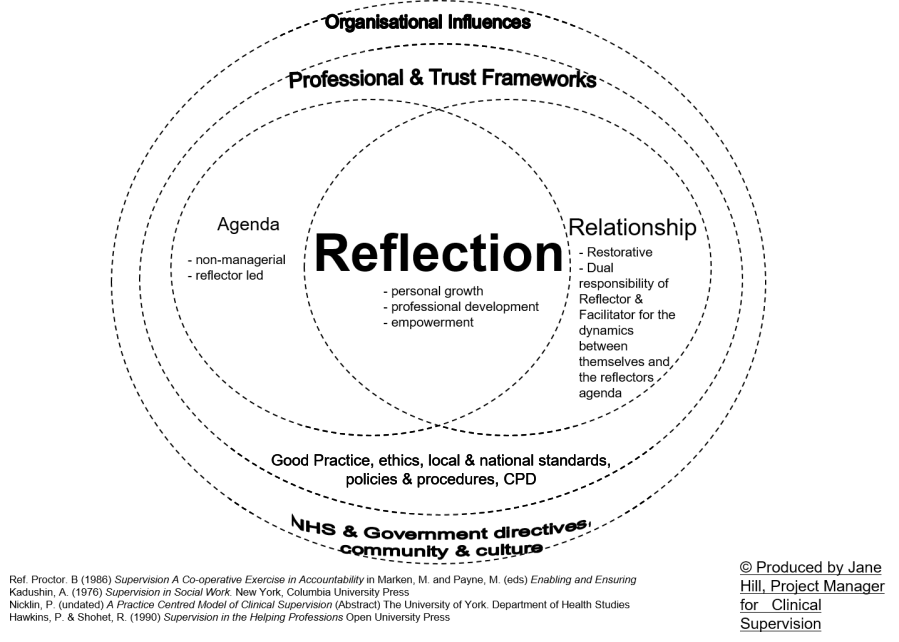NMCS Model and Training
Non-managerial Clinical Supervision (NMCS) supports the Appraisal process, Continuous Professional Development (CPD) and the Clinical Governance agenda. Reflection is used as the central tool in NMCS, enabling the practitioner to examine their clinical practice in a safe, supportive, non-judgemental environment. Participants are taught how to positively challenge their own and other peoples practice; with the aim of bringing about positive change and modernising services for patients.
Entry Requirements
You should be working as a qualified Allied Health Professional, Health Care Scientist, Nurse, Midwife, Health Visitor or other health care professional, undertaking an extended role or autonomous practice. In all cases it is expected that you will practice NMCS as soon as you return to the workplace. For those new to NMCS it is strongly recommended you train with the group you will use the technique with. This training does not give you the skills to cascade NMCS Training. A separate ‘Train the Trainer’ course is available to those who can provide evidence of attending NMCS session for at least one year post training. The techniques taught may be transferred to student supervision but are intended for qualified staff. Training is required before joining a group to ensure the model, protocol and the required style of communication is understood and adhered to.
Why should I study this course?
All health practitioners are expected to be part of a supervision and regulatory process that can clearly show fitness to practice. NMCS is an evidence based inclusive and
sustainable supervision process that has been developed and used since 2000 in England and 2005 in Ireland.
Why is it called Non Managerial?
Every clinician is responsible for their own practice. NMCS cannot work without the support of managers, but is based on the belief that everyone has the potential to reflect and
learn from their own experience, as well as an ability to listen to and support the reflection of others, regardless of grading or length of experience. NMCS is complementary to, but does not replace
managerial supervision.
Non-managerial Clinical Supervision (NMCS) Follow-up training – six months
The initial NMCS training should equip you to complete a minimum of 3 NMCS sessions. It is then recommended that you attend a follow up session to examine the application of the theory and practical sessions taught in the original training, in addition the application of the model and protocol is reviewed. The most benefit is gained from this session if participants attend with their full group of NMCS members. The initial part of the follow – up session is spent discussing and answering questions from the participants. This is followed by the participants forming NMCS groups with the trainer joining each group to provide feedback.
Non-managerial Clinical Supervision (NMCS) Follow-up training – twelve months
To attend this course a minimum of 6 NMCS session should have been completed. The trainer will review the participants use of the model and protocol. Any issues that arise will be discussed and addressed. The most benefit is gained from this session if participants attend with their full group of NMCS members.
NMCS Train the Trainer
This 5 day course covers all the theoretical knowledge and practical skills needed to run NMCS training within your own organisation. Content includes: • Preparation of self and physical environment • Using a variety of presentation styles • Responding to groups with different learning styles • Action to take if conflict arises • Revision and presentation of NMCS basic training materials To be eligible for the course you must provide evidence of your initial NMCS training and attendance at NMCS session for at least 12 months. Your application must be supported by your manager who can show that you will be enabled to run NMCS courses following the course. These courses are run on a request basis only.
The Model of Non-Managerial Clinical Supervision


